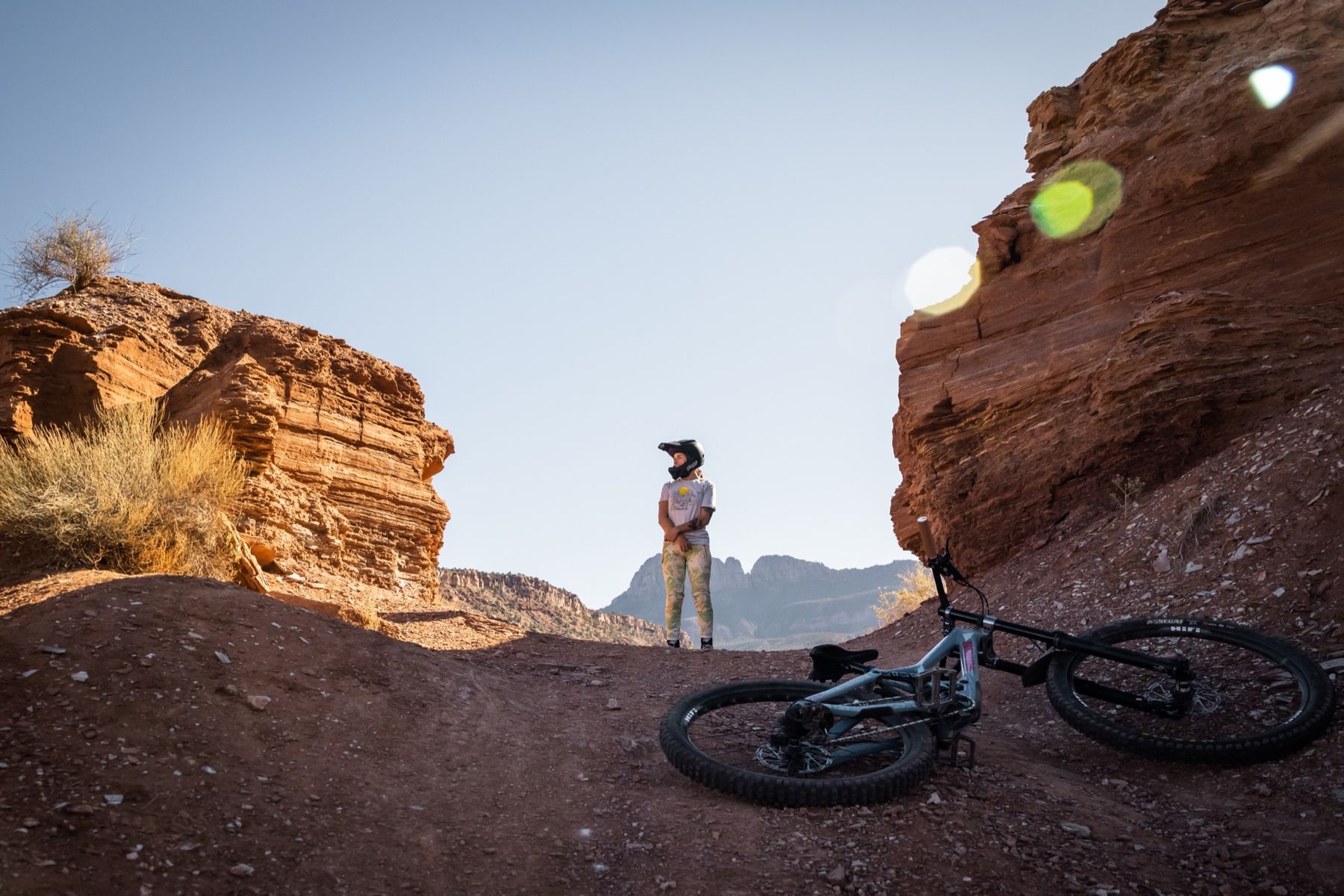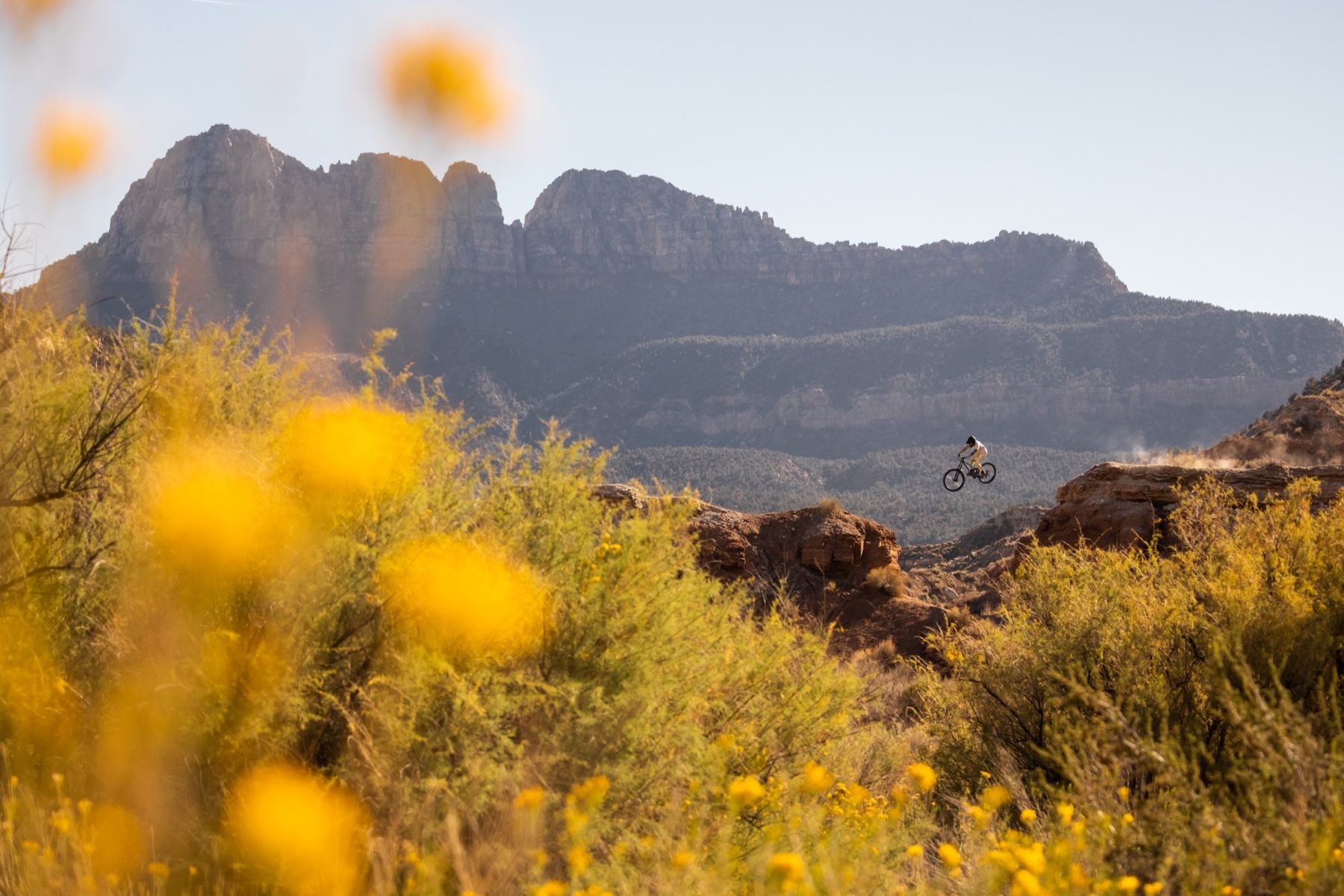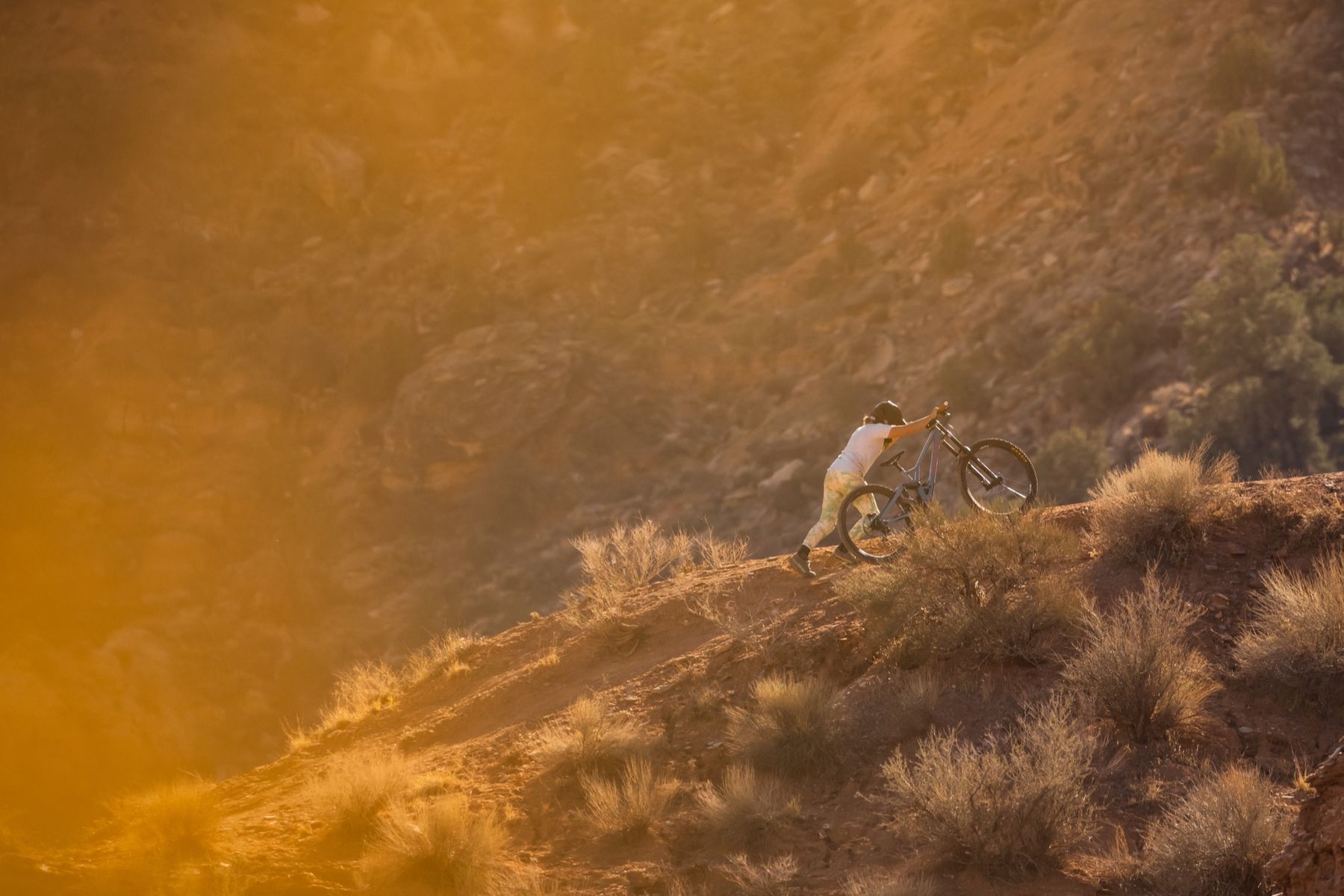El Jaskowska is a rider and passionate advocate for broadening participation in mountain biking. In this Spotlight Series, she is interviewing riders from all walks of life and styles of riding to discover the common joys and passions that bring us all together through mountain biking
It’s been 20 years since a handful of riders first stood on top of a mountain in Utah and waited for the wind to die down before hitting some of the biggest features in big mountain freeride. Even for those not riding, the experience of digging at Rampage has accelerated many talented riders on their own journeys and Blake Hansen is no different. Fresh from digging at Rampage and Formation we caught up with Blake over her morning coffee to find out more about exposure therapy, personal progression and the growth of women’s freeride.

Digging must be a really creative pursuit in it’s own right? The structures you’re building, seeing lines, building take offs. ‘Building stuff I would never consider jumping off until we’re all together talking about it.’ Blake tries to laugh it off but it’s clear that there is something that comes out of the digging process, working out how a take off or landing would need to be built in order to be successful ‘and then the therapy of doing that and saying “now I understand” my brain is different now and I can probably do that, and turns out I can’.
It turns out there is more to exposure therapy than just hanging out on the mountain and getting used to the height, the dirt and the features. ‘It’s hugely changing to build or rebuild it yourself’ she explains, ‘it gives you an intimate look and feel into the feature that’s totally different to if you’d just rolled up to it. It lends a deeper understanding of the dirt, distances and depth of features. It really helps to ingrain into us the kind of speeds and body positions you need to be working with in order to get over a feature.’ So rather than having elite senses, the process of spending time out there and working with the features allows the riders to gain senses in other ways and ultimately leads to greater success attempting jumps and tricks.

That alludes to the fact that the collaborative jam-fest structure of Formation, Red Bull’s female progression freeride event, also accelerates the learning process for riders. ‘It is magic, watching someone being a little bit scared to try something and then they succeed. It amps everyone else up! It’s crazy!’ The deliberate design is the brainchild of Katie Holden and creates a space where women and female identifying riders can all grow and develop. ‘It’s not about showing up, being the best and getting on a podium and saying ‘I’m awesome gimme a bunch of money!’ We can work together to learn from each other and show ourselves what we’re capable of, and bring other people along too who might also be interested in doing this.’
Traditionally, women wanting to make a living from mountain biking have turned to racing but now that professional paths in women’s freeride exist, giving access to these opportunities to the younger generation sooner is going to blow up the sport. ‘The curve that we’re experiencing now isn’t 1 to 2 to 3, it’s 2 to 4 to 8 and it keeps getting steeper.’ Hansen herself is an enduro racer approached by Katie Holden in a conversation that went something like:
‘You freeride’
‘I don’t’
‘You live in Utah and you ride in the desert all the time, you should come to Formation and dig!’
From being stoked on racing to questioning how many races she’ll do next year, the experience, collaboration and sponsorship response has been encouraging. Further evidence that the structure being built into women’s freeride is helping to make it a success.

On the topic of sponsor support we explored to what extent are brands making genuine investments in supporting riders and their development or whether tokenism is rife. ‘It’s a relationship business’ she starts. ‘I’ve been with my main sponsors for multiple years now, they know me and what my goals are and who I am as a person, so that is authentic’. Unfortunately it isn’t always like that ‘I do see a lot of companies trying to piggy back’ she continues ‘I just had a bad interaction with a company and I think although that was a negative experience, it taught me how to read what people are looking for’.
The effort invested into building these sponsor relationships has paid off. Blake works in film and operates as a small business owner, allowing her to take and refuse work depending on how it fits with her riding schedule. But this does end up in her leaning into riding for a few weeks then having to lean heavily into work when she returns, barely touching her bike while she catches up with the backlog. ‘Next year is a pivotal year for me in having more time and support to ride bikes but still having some time to do it all.’ And this is the support that is pivotal in raising the bar for underrepresented riders. Having the financial support to swing less and dedicate more time to bikes and developing their riding, accepting race and event invitations to grow their network. Blake is a creature of habit and recognises her tendency to dive head first into self progression ‘if I’m too into it [riding] I won’t think of anything else and the laundry won’t get done and my girlfriend will get mad at me because I’ve not spoken to her in three days. So it’s good to turn it off every now and again. While I’m excited to have a lot more time to dedicate to riding next year, I’m still going to make sure that I don’t turn everything else off!’
That’s the story about how Blake got into freeriding, but to really understand what drives her we delved into how she found and re-found bikes. Growing up in California she described the bike as being the first honest relationship of her life, but it wasn’t a straightforward path carrying this into her professional riding career. For about six years she didn’t touch a bike and just snowboarded. ‘I’d just moved out of the house on my own and I was in the mindset that I wasn’t who I really am. I was trying to avoid reality so I would spend most waking hours snowboarding. I’d take 6-9 credits at university so I didn’t have to stop snowboarding. I think I got my bachelors degree in 8 years because I was snowboarding so much!’.
One day Blake decided that something needed to change. ‘Then all of a sudden snowboarding became the place that I wasn’t really happy anymore because of my relationships there, and my relationship with the sport had become a bit of a thing of avoidance’. Certainly not someone to do things by halves, when she came back to the bike she threw herself into developing a relationship with a sport that was healthy for her and spent a lot of time developing relationships with the people in the sport. Something had fundamentally changed this time because she was also in the middle of transitioning and becoming who she really is. ‘It took a long time to feel like an honest relationship again because I was still building relationships with people to feel safe. It was a new world to me. It has become what I wanted it to be, the space in which I’m most honest, but it took a while to get there’.
Blake’s superpower is her life experience, and it comes across. When she was experiencing all the challenges of transitioning she started racing and it gave her something fresh ‘when life itself was unbearable, it gave me something to be excited about’. Eventually it circled her back to snowboarding, where she was able to rebuild a positive relationship with the sport.
Despite the films, sponsors and community she’s built, Blake still tells herself ‘don’t ask for permission’ for reassurance that she deserves to be where she is. Asking what advice she would give to others in the community who haven’t always been made to feel welcome she explains. ‘You belong because you decide you want to belong. Whether that’s because you’re a mountain biker or you want to be a part of this community, you get to because you want to. It’s your choice. What you bring is unique to you. There’s a place for you here’.

There are two sides to every story and there are so many riders who would love to see our community become more diverse and benefit from the stories and influences that this would bring. What can we do to show marginalised riders that we do support them being here? Blake makes it sound simple ‘As a rider I’m constantly wondering if the riders who don’t explicitly give their support are quiet because they’re against me. A lot of the time the people who don’t support me aren’t loud, they are silent. If you are a rider and you want more diversity you should say it, it’s that simple: “Hey. I’m really psyched that you’re here”. It’s really important for the allies to state themselves as allies.’ We also shouldn’t let our anxieties around putting a foot wrong or accidentally offending hold us back from voicing support. ‘For the most part everyone wants to be inclusive. If your intentions are in the right place, being open and inquisitive is a more positive thing than being too reserved to ask questions.’ Blake reassures.
We’re excited for what happens next both for Blake and for women’s freeride. At the moment she’s out in Virgin shooting a film with Hannah Bergemann and Sam Soriano spotlighting an 11 year old girl Sophie ‘who is the most fearless little thing that you’ve ever seen’. Sophie isn’t too far off what’s happening more normally now, go on Instagram and you’ll see plenty of 14 year olds pulling backflip barspins. Now that a professional path exists for women in freeride and in other extreme sports, the youth side is developing in response to demand. If you think women’s freeride is awesome now, we ain’t seen nothing yet!
Thanks to Emily Sierra for the photography




